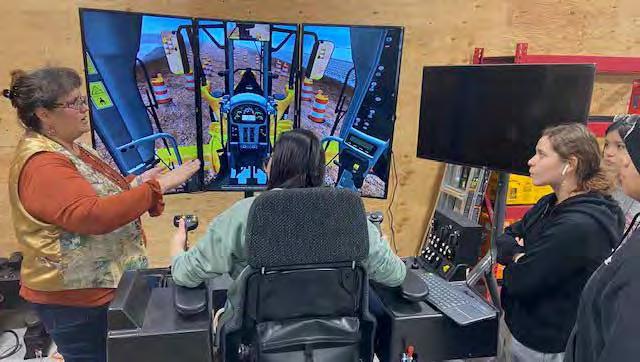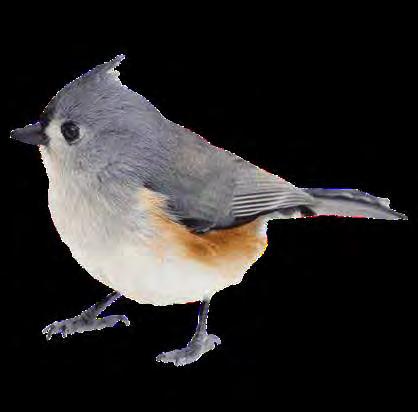
3 minute read
Nixyaawii Community School students begin CAT simulator training
By John Barkley, TERO Program Manager
MISSION — Students from the Nixyáawii Community School’s construction class began training January 25th on a CAT simulator that does both front end loader and motor grader. The simulator was purchased with a Career Technical Education (CTE) grant from the Oregon Department of Education (ODE), who’s representatives were on hand to see the training first hand.
The CTE grant purchased the simulator but due to the pandemic the past two years, training was not available until recently.
“This training will be valuable to the students to learn how to operate heavy equipment and hopefully pique their interest in pursuing viable construction careers in the area,” said John Barkley, program manager of the Tribal Employment Rights Office who is coordinating the training.
The CAT simulator is located in the Food Distribution Center at South Coyote Business Park. TERO is leasing space for the simulator and shop area from the Tribes’ Department of Economic & Community Development (DECD) department
“We intend to offer a preapprenticeship construction training program once we get the curriculum and scheduled outlined,” Barkley added, citing a grant from the Ready For Oregon program under the Bureau of Labor & Industries (BOLI).
TERO is working with various resources for this effort which includes Indian Owned Businesses certified by TERO, several tribal departments and programs, contractors and representatives of the building trade unions who’ve agreed to support the training by offering in-kind services.
NCS Construction Class Instructor Zack Brandsen said the training “was a real cool experience and something that the students really were excited to try out.”
The students will undergo training 3 days per week, led by TERO staff including Michelle Bratlie, TERO Dispatch Officer who is already certified for traffic control (flagging), OSHA 10/30 and Hazwoper.
“The students were responsive and super excited about this training,” said Bratlie, “Landen (Picard) already taught me something about the simulator. This is the best part of my week!”
On the second day of training, staff from ODE were present after meeting with the CTUIR Department of Education staff earlier, including director Modesta Minthorn, who said “the CAT simulator is an awesome tool for students to learn here and earn credit for the class. I hope the students take advantage of this opportunity and learn all they can.”
ODE staff included Renee Roman Nose, Native American Student Success Coordinator; Susan Samek, Tribal Liaison; and Jeremy Ahola, Youth Program and Strategic Analyst, Oregon Youth Corps Grants, Office of Workforce Investments, Higher Education Coordinating Commission.
They were very impressed with the CAT simulator and training done by TERO for the NCS students, and intend to develop a relationship with TERO and explore other potential training programs complimenting this effort.
TERO has worked with the Office of Public Works who has CAT heavy equipment. Once students are trained adequately, they will operate actual heavy equipment as follow up to their simulator training.
TERO also acquired a welding simulator, cargo tool trailer, and power and hand tools for training via a grant from the Marathon Petroleum Foundation, who had been very supportive of training tribal youth for construction careers.
“This is just a start,” said Barkley, “we need TERO construction workers on our projects, and if we build another hotel tower, water treatment plant, or other economic growth projects – besides our ODOT projects - we need tribal members, descendants and spouses trained to gain valuable experience and skills to support their livelihoods.”
Púuyay | snow bird
Dark Eyed Junco (Junco hyemalis)

Did you know the Umatilla Homeland is home to more than 60 species of song birds? Unfortunately, our feline friends both domestic and feral put song birds at greater risk from changing climate conditions.
Proactive community members can help song birds!
Place bird houses up and away from our cat friends’ leaping capabilities
Bring domestic cats inside from dusk past dawn
Engage domestic cats in play often; cats getting enough stimulation are less likely to attack birds
Use a colorful high visibility collar to alert birds the Umatilla Indian Reservation (CTUIR), Department of Natural Resources (DNR): First Foods Policy Program invites you to share your voice!
Spay or neuter domestic and feral cats as much as possible to manage future generations

Plant native plants for song bird food and habitat
We can all do our part! Join us to learn more about what our Tribal government is doing and what you can do as a community member to protect our First Foods and sister foragers like song birds.
Learn more about CTUIR Plans and Policies, and engage with CTUIR staff and partners
Share your experiences with us! Events will be held throughout 2023 , and offered in many interactive formats:
Climate Adaptation Plan (CAP) implementation survey
Umatilla Basin Water Rights Settlement hybrid events and tours
Policy in Action workshops and youth activities
Outreach events scheduled for the 2nd Wednesday of each month beginning in February 2023, and additional events to be advertised monthly in CUJ.
First kick-off virtual event: CAP Review Feb 8th 9:30 11 AM
Want to stay informed ? Email FirstFoods@ctuir.org to register for events and announcements.
February 2023










